Hello! For Your College Prompts, What Advice Would You Give The Students Who Don't Really Have Any Outstanding
hello! for your college prompts, what advice would you give the students who don't really have any outstanding achievements? the ones who didn't join any contests or have any notable experiences to write about :(
Hi, thanks for the question!
Honestly, every experience can be written as notable. It really depends on how you word your answers. Personal stories, like caring for ill siblings can be described as inspiration for students going into the medical field or school art projects, like painting self-portraits can be described as an eye-opening experience in self-reflection for students planning to study arts.
It’s really important to remember that even though high achievements and notable experiences contribute to an individual’s application, it does not necessarily make or break an individual’s profile. This might sound deceptive, but honestly play up your strengths. (You might not think you have any really good ones, but trust me they’re there!) I’d recommend doing a bit of research of your field of interest’s general responsibilities and focusing on any transferable skills that you currently possess that can be detailed in a college essay or application form. Many scholarship and college committees are looking for students willing to think outside the box, identify transferable experiences for field compatibility and show a clear interest in studying at the school of application. The experience is not the important thing, the reflection and lessons learned are what’s most important. If you show evidence of your ability to commit and work diligently, while showing clear signs of potential; schools will definitely be interested in taking you under their wing.
Hobbies can also play a key role in applications, even non-school or organization held ones. As long as you can show evidence of progress (i.e. photography, videos, maybe a participation certificate) for an activity, self-taught instruments or languages are very impressive. Other hobbies such as crafting, machinery or creative writing can also be assets! I suggest making a list of your daily activities and going from there. Sometimes activities that you may not have considered (i.e. cooking, baking, etc) can greatly contribute to an application. Here’s just a couple examples that could possibly be helpful in the formatting of this sort of writing:
Baking (Have you considered baking something for a charity event? Baking a cake or a tray of cookies can add to your application because you can include the title of charity event volunteer and contributor or that you’ve baked to support charity events.)
Blogging (Even Tumblr blogging! As long as you can show evidence of original posts with a socially acceptable theme (I’d recommend “educational (meaning anything you can learn,)” current-event or literature-based content) you can say that you enjoy writing articles in your spare time and host a blog where you contribute original content.)
Travel (Travel a lot with your family or friends? Spin this experience into a cultural exploration activity and focus heavily on personal reflections of your trip. By doing this, you can say that you have a strong interest in sociology, modern anthropology and ancient anthropology.)
It’s never too late to pick up new skills! Keep an eye out for new opportunities to expand your abilities and community involvement and who’s knows maybe you’ll even find an activity you become extremely passionate about! Here’s some other tips to show off your skills:
Use a higher variety of language in writing: This means, use a thesaurus for application writing! A higher language variety shows that a student has a higher linguistic interest. In saying this however, do not change every word in sentences or an obvious pattern such as one-change-per-sentence! Contribute where you feel you can be fancy.
Name-drop: By that meaning, cleverly mention the names of organizations and companies you’ve been involved with. Involvement refers to any sort of assistance with physical evidence. (Remember that baking example I mentioned earlier? Say that the organization in question was Free the Children - you could add Free the Children charity event volunteer and contributor to your application.) Do not call out organizations randomly but strategically - if it just so happens that the charity in question was present and involved then it doesn’t hurt to add that to your application. This shows that a student is well-connected in their communities as well as being apt at networking.
Strategic self-reflection: In detailing how you felt and what you learned, include references to any historical/current events, academic curriculum or personal interest educational content! For example:
As I explore the streets of Greece, I cannot help but appreciate cultural identities that are in constant evolution. Greece, once a centerpiece of economic power now lies in a new era; one of economic uncertainty in the shadows of the growing strength of several new power players - the United States and China.
This shows that a student has high intellectual ability, is good at problem solving and applying their knowledge where it can be used.
More Posts from Swirlspill-study and Others



Music revives me after stu(dying) 12+ hours a day ;-; If y'all have any music recs please hmu ♡

Sometimes, when we are presenting, our bodies act completely irrationally. Sweating, stuttering, or just shutting down completely are all things I have encountered during public speaking; behaviour that is usually connected to extreme danger and fleeing behaviour. Completely unnecessary, as your teacher won’t kill you (hopefully), but trying to convince your body to be just as rational is a tough task. Turns out that this is exactly what we’re going to do.
The basis for this (personal) advice all lies in my musical training, where posture is extremely important. Performance practice lessons have taught me one important thing: you can trick your body into thinking it’s okay, and with that, your audience. disclaimer: I have posted this information before in a slightly different way. Regard this as an updated version. Hopefully one with better spelling.
hoooooow???
Stand up and try to follow these instructions. I’m your only audience right now, so mistakes aren’t a problem.
Start by relaxing your shoulders. Many people tense their shoulders when they’re anxious, which is a very natural reaction. However, tension in your shoulder automatically reaches through to your back and arms, and even your neck, tensing up your entire upper body. It’s confirming to your brain that yes! this is scary! Well, brain is wrong and we’re going to prove it wrong by relaxing our shoulders. Just let them hang down (make sure you don’t start leaning forward though, it should be just your shoulders). Doesn’t that immediately feel more relaxed?
Keep your feet a little bit apart, firm on the ground. This sends the message to your brain and audience that a single push will not have you fall over. Standing with your legs closely together simply isn’t as stable, and you want to radiate stability and confidence. Even if you’re feeling dizzy, this simple way of pretending will keep your feet on the ground. Literally.
Chin up, back straight, eyes at the audience. I used to tend to look at the ground, or to lean forward. No, no no! You want to maintain an open posture, and to address the entire audience. When you do this, you’ll look more secure, and maybe you’ll even notice people will listen to you more closely. Make sure you address the entire room, and not just one spot. if you’re scared to look at faces, look at the back wall. But not just one spot, find some nice different wall spots to look at.
What to do with your hands? I know I used to put my hands in my pocket, or fidget with something. Instead, try to talk with your hands more. When you’re using gestures, people will usually pay more attention to what you’re saying, and they’ll sometimes understand more easily (if you’re interested as to why, message me).
Do not hide. This is special advice to musicians, too. I used to hide behind my music stand because it was nice and safe. During public speaking it’s easy to hide behind some notes or to stand behind other people of your group, maybe. Don’t. Remember, fake the confident posture till you make it.
When you’re finished, don’t stop pretending just yet. When people ask how it went, always say it went okay. This is so so so important! Because if you’d say “ugh it was awful!! So many things went wrong, I suck at presenting!” they’ll start thinking hmm, yeah, there were indeed some mistakes… Could have been better. Whereas if you just say it was okay or good, or even decent, they’ll hardly even question it and will most likely remember the positive aspects, as humans tend to do.
I promise this works, at least to some extent. It may not help you get rid of anxiety right away, especially in really severe cases, but it can help you feel more at ease in front of a group. After that, you can start working on other things, such as volume, intonation, powerpoint use etc.
Just take a few seconds before you start talking to breathe, focus on those muscles, and to follow this with an amazing presentation (and a good grade).
You can always send me an ask for advice on public speaking! Even though I’m not a professional coach or whatever, I have overcome my speaking anxiety and maybe I can be of any help at all <3
A Note on “Weeder Courses”
Is your first year gen-ed (general education) course really hard for absolutely no reason? Or perhaps it’s an early course in your major that’s required for the rest of the degree. Maybe the homework is really hard to get through or the exams are just brutal. You might be in a “weeder course.”
Generally weeder courses are introductory level; the STEM field gen-eds are notorious for this. The thought process from an administrative level is to make these courses very difficult and challenging to vet out students who can’t hack it. They do it with the intro level courses to serve as a warning for students who might want to major in something, but aren’t ready for how rigorous the degree actually is.
Now I have my own thoughts on that mindset but what I want to stress that these courses are designed to be difficult. You’re not making it up in your mind; they are designed to feel like hell.
Personal anecdote: I got my undergrad degree in literal rocket science from a “name” university. In my first year I failed physics I, the very course that is the basis for the rest of your physics education. I nearly failed it again the second time I took it, passing by the skin of my teeth. Despite the material being more difficult, I found my calculus 4 course easier than my calculus 1 course.
And that was because, as I found out from an upperclassman years later, those intro courses were designed as weeder courses. They taught the material yes, but their primary function was to act as a buffer to students who the administration see as lacking the discipline to follow through on a major in that field.
My advice? If it is a field or major you love, do not let your performance in these classes stop you.
I cannot stress this enough: if you love the field and the major and the subject, don’t let terribly designed classes stop you. I worked as a peer advisor my senior year and I had these brilliant first and second year students come up to me and tell me that they were struggling in an intro level course, wondering if they should drop out of a major they genuinely loved because they felt like they weren’t smart enough. Every single one of them was smart enough.
You are smart enough. You can and will get through it.
Some advice of a more practical nature under the cut:
Keep reading
10 Captivating Short Stories Everyone Should Read
1. The Most Dangerous Game by Richard Connell — The story of a big game hunter finding himself stranded on an island and becoming the hunted.
2. The Last Question by Isaac Asimov — A question is posed to a supercomputer that does not get answered until the end days of man.
3. The Last Answer by Isaac Asimov — A man passes away and has a conversation with the Voice in the afterlife.
4. The Yellow Wallpaper by Charlotte Perkins Gilman — A collection of journal entries written by a woman whose physician husband has confined her to the upstairs bedroom of the house.
5. The Lottery by Shirley Jackson — The story of one small town’s ritual know only as “the lottery.”
6. Hills Like White Elephants by Ernest Hemingway — A couple has a tension-filled conversation at a train station in Spain.
7. All Summer in a Day by Ray Bradbury — A group of schoolchildren live on Venus where the Sun is visible for only two hours every seven years.
8. Harrison Bergeron by Kurt Vonnegut — It is the year 2081, and all Americans are equal in every possible way.
9. The Monkey by Stephen King — The story of a cymbal-banging monkey toy that controls the lives around it.
10. We Can Get Them For You Wholesale by Neil Gaiman — A man named Peter searches the phone book for an assassin to kill his unfaithful fiancée.

Writing a commentary or essay on a text you’ve never read before in exam conditions can be daunting, but with the proper approach to it, you can ace your way through it with little to no stress!
Before the exam
Familiarise yourself with how we read and find meaning in any text.
What are the effects of different types of structure, narration, rhythm, action, diction, sound, setting, characterisation, figurative language, tone, atmosphere, imagery, subject, themes, ideas, etc.
Knowing the common devices authors use to create meaning allows you to identify them more easily in any given text.
Practice, practice, practice!
Find any past exam papers available, even if they are for a different type of certificate, and practice them under exam conditions.
Take excerpts out of a random book and practice, whether it be from a library, or your own personal collection.
The more you practice critically analysing a text, the easier it will become. If you don’t have the time to sit down and write out a complete essay, even planning how you would structure your essay and the ideas you would discuss is beneficial. This really cannot be over stressed, the more you write on unseen texts, the more comfortable you will be tackling another in a serious exam situation.
If the essay must be handwritten, this will also give you an opportunity to ensure your handwriting is legible and you are used to writing for prolonged periods of time.
Compare ideas in a group.
I always find working in groups for English to be highly effective. By discussing a text with a group of friends, someone will probably express an idea you had not considered before and you’ll be more open for alternate interpretations and more likely to recognise them in your own time
Critique your past essays.
Whether they were prepared or unprepared essays, identify areas where you need to work on to improve your essay writing.
Recognise your strengths as well and make an effort to try and include them in all your future essays!
During the exam
Read the text several times.
Before reading it, look for anything that immediately sticks out. For poetry, is there a distinctive shape? For prose, how is the text separated - one block of text, or several paragraphs?
Your first read should simply be for initial impressions. Is there anything that strikes you as important? What is the main idea of the text after only reading it once? What is its tone?
The second reading should be for content. What ideas are at the forefront? What is the author trying to communicate? Underline and note aspects in the text about this. Colour-coding your annotations can be helpful here!
In your third reading, you should start noting the style. What stylistic features are prominent? There will likely be a lot on imagery, syntax, diction, structure, etc. Focus on the most important ones and their impact. Is there more to it than meets the eye?
Deconstructs the question if you are given one so you fully understand what it is asking you to do.
Probably stating the obvious, but it is so important to understand what the question is asking you to write about. Understanding the question can mean the difference between a standard essay and an amazing one.
Don’t just identify a familiar word in the question and use it to write about whatever you want. Make sure what you’re going to write about addresses all parts to the question. If you’re asked to write about how and to what effect something has had an impact on the reader, don’t just write about how; you must write about to what effect as well! I usually underline the most important parts of the question so I don’t forget to write about them.
Define relevant key terms that are important to the question. How is a character made interesting? What is meant by unreliable? Try to subtly integrate these into your introduction.
Plan your essay.
An examiner will usually be able to tell the difference between a planned and unplanned essay. Planning gives your essay structure, coherence, and makes it easy to follow.
You can take a linear structure, addressing aspects of the text line by line. Alternatively, you can take a conceptual approach - discussing narration in one paragraph, imagery in another, etc. In my experience, the conceptual approach usually scores higher, however it is really up to the text you are analysing and what you are comfortable writing with!
If you aren’t given any prompts or a guiding question, make sure your argument is really clearly outlined in your introduction, or else you’ll leave the examiner guessing as to what you’re writing about.
Make sure to include important quotes and examples in your plan so you don’t leave them out when you write it.
If you are stuck as to what your line of argument should be, I usually like to address how various techniques are used effectively to communicate the theme. It’s a general and open ended question that will fit any kind of text, so long as you identify the techniques and devices!
Essay must-haves:
Include a macro sentence as the first sentence of your introduction. Draw the reader in with a statement that broadly covers the ideas you are going to cover.
Every paragraph must start with a topic sentence and end with a concluding sentence that links it back to the aim of your essay. This also ensures that you actually address what you set out to talk about.
Integrate quotes and examples smoothly into your arguments. Small phrases and individual words especially give your arguments concrete evidence, and allow you to work the detail of the text.
Proof-read your completed essay.
There is nothing worse than to come across a simple grammatical mistake that was overlooked in a really well organised and argued essay. Try to read your essay through twice before handing it up to try and identify these stupid mistakes we all make under pressure.
Sorry for such a long post! This turned out a lot longer and more in-depth than I thought it would be, but hopefully it will be helpful to those of you who have any unprepared texts to tackle. Let me know if anything is unclear or if you have any questions here :) xx
![[ 02.05.16 • 4/100 DAYS OF PRODUCTIVITY ] 4 Days Till My Exams Yikes D: My First Exam Isn’t Even](https://64.media.tumblr.com/fa179b83534ebe2774fdc0fa4774fb65/tumblr_o6jqaaQSBT1sxzvapo1_500.jpg)
[ 02.05.16 • 4/100 DAYS OF PRODUCTIVITY ] 4 days till my exams yikes D: my first exam isn’t even geography but the subject is so content heavy so I’m studying first even though I have 8 days to the exam ahhhh didn’t really bother putting a super nice set-up for the picture because meh good luck to those having their mid-years or their finals!!
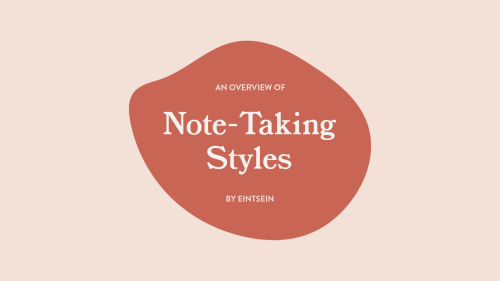

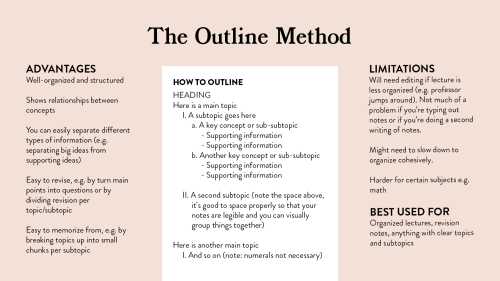
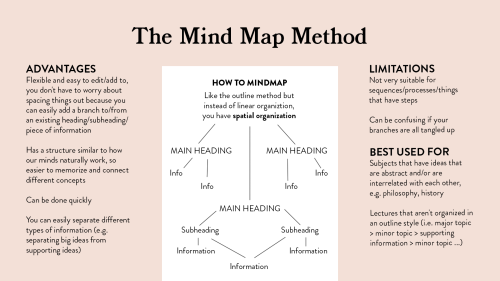

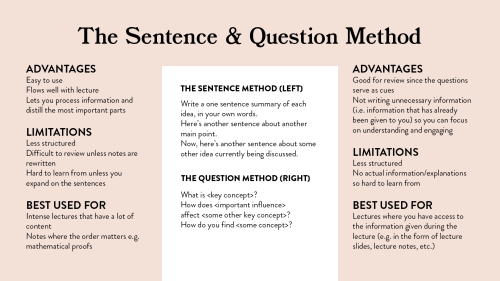


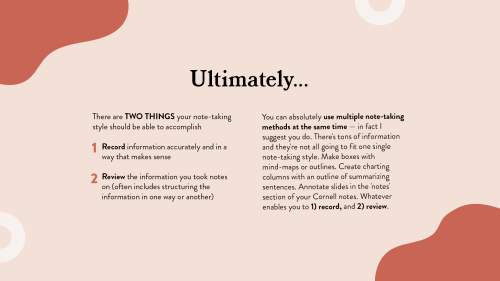
An Overview of Note-Taking Styles
Note-taking is one of the most essential skills a student should master. It allows you to record and review information to be used in the future. But what’s the best way to do so? Here’s an overview of note-taking styles that can help you maximize your learning!
If you spend a lot of time on your laptop for work, study, etc., you should definitely check out this app called Noizio. It provides ambient background sounds that help calm you or keep you focused. You can even make and save your own combination of sounds. My personal favourite is winter wind + wind chimes + sea waves. Each sound’s volume can be adjusted individually as well!
-
 letscandyme liked this · 2 years ago
letscandyme liked this · 2 years ago -
 freeziequeen liked this · 4 years ago
freeziequeen liked this · 4 years ago -
 ppinkblood liked this · 4 years ago
ppinkblood liked this · 4 years ago -
 got-no-username liked this · 4 years ago
got-no-username liked this · 4 years ago -
 hxneyberry reblogged this · 4 years ago
hxneyberry reblogged this · 4 years ago -
 lacomplaintedusoleil liked this · 4 years ago
lacomplaintedusoleil liked this · 4 years ago -
 thesunflowermartini liked this · 4 years ago
thesunflowermartini liked this · 4 years ago -
 asiehisthename liked this · 5 years ago
asiehisthename liked this · 5 years ago -
 aesthetistudies liked this · 5 years ago
aesthetistudies liked this · 5 years ago -
 honeyochii liked this · 5 years ago
honeyochii liked this · 5 years ago -
 mnkosdream reblogged this · 5 years ago
mnkosdream reblogged this · 5 years ago -
 mnkosdream liked this · 5 years ago
mnkosdream liked this · 5 years ago -
 fooledneon liked this · 5 years ago
fooledneon liked this · 5 years ago -
 ketlen4college reblogged this · 5 years ago
ketlen4college reblogged this · 5 years ago -
 lijah-studies reblogged this · 5 years ago
lijah-studies reblogged this · 5 years ago -
 lijah-studies liked this · 5 years ago
lijah-studies liked this · 5 years ago -
 intellectuls reblogged this · 5 years ago
intellectuls reblogged this · 5 years ago -
 intellectuls reblogged this · 5 years ago
intellectuls reblogged this · 5 years ago -
 intellectuls liked this · 5 years ago
intellectuls liked this · 5 years ago -
 swirlspill-study reblogged this · 6 years ago
swirlspill-study reblogged this · 6 years ago -
 stuckinthiseuniverse liked this · 6 years ago
stuckinthiseuniverse liked this · 6 years ago -
 81wdcs liked this · 6 years ago
81wdcs liked this · 6 years ago -
 hollygothlightly-blog liked this · 6 years ago
hollygothlightly-blog liked this · 6 years ago -
 starpringle liked this · 6 years ago
starpringle liked this · 6 years ago -
 annessun liked this · 6 years ago
annessun liked this · 6 years ago -
 hydrationcowboy liked this · 6 years ago
hydrationcowboy liked this · 6 years ago -
 krythai-blog liked this · 6 years ago
krythai-blog liked this · 6 years ago -
 haniibunnie liked this · 6 years ago
haniibunnie liked this · 6 years ago -
 pessimisticrebel liked this · 6 years ago
pessimisticrebel liked this · 6 years ago -
 mortallyperfectpenguin reblogged this · 6 years ago
mortallyperfectpenguin reblogged this · 6 years ago -
 svnrae liked this · 6 years ago
svnrae liked this · 6 years ago -
 nightlites liked this · 7 years ago
nightlites liked this · 7 years ago -
 avocadogoat liked this · 7 years ago
avocadogoat liked this · 7 years ago -
 guayabaenjoyer3000 liked this · 7 years ago
guayabaenjoyer3000 liked this · 7 years ago -
 alexispasalexis liked this · 7 years ago
alexispasalexis liked this · 7 years ago -
 waywardcerberus liked this · 7 years ago
waywardcerberus liked this · 7 years ago -
 barestudy-blog liked this · 7 years ago
barestudy-blog liked this · 7 years ago -
 2awkward41 liked this · 7 years ago
2awkward41 liked this · 7 years ago -
 atnuka liked this · 7 years ago
atnuka liked this · 7 years ago -
 elemented2 liked this · 7 years ago
elemented2 liked this · 7 years ago -
 yosarrian1 liked this · 7 years ago
yosarrian1 liked this · 7 years ago -
 arlisestudies reblogged this · 7 years ago
arlisestudies reblogged this · 7 years ago -
 aggressive-honey-blog reblogged this · 7 years ago
aggressive-honey-blog reblogged this · 7 years ago -
 kinror0-blog reblogged this · 8 years ago
kinror0-blog reblogged this · 8 years ago -
 kinror0-blog liked this · 8 years ago
kinror0-blog liked this · 8 years ago
a study blog for collected references, advice, and inspiration
267 posts

